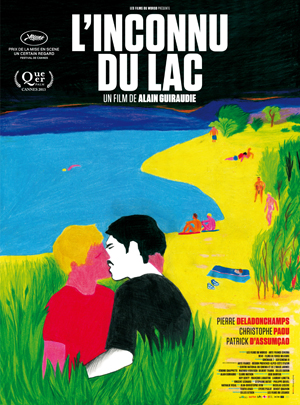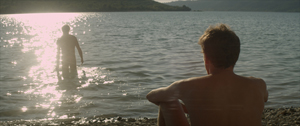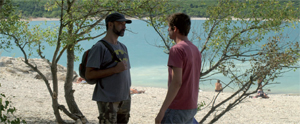Film Review – L’Inconnu du Lac: Lakeside Cruising
- SUBSCRIBE
- ALREADY SUBSCRIBED?
BECOME A BONJOUR PARIS MEMBER
Gain full access to our collection of over 5,000 articles and bring the City of Light into your life. Just 80 USD per year.
Find out why you should become a member here.
Sign in
Fill in your credentials below.
 Given the paroxysms attending France’s legalization of gay marriage, it’s only fitting that a remarkable gay-themed film has recently come out in Paris. No, not Blue is the Warmest Color. L’Inconnu du Lac, directed by Alain Guiraudie has garnered critical raves and was chosen for Canne’s Un Certain Régard selection. Perhaps because this raw film focuses on male homosexuals it hasn’t had the attention given to Blue, or the controversy about “authenticity” (but was given a restricted rating). L’Inconnu du Lac (Stranger by the Lake) is a strange combination of gay idyll, medium-core porn, and murder mystery.
Given the paroxysms attending France’s legalization of gay marriage, it’s only fitting that a remarkable gay-themed film has recently come out in Paris. No, not Blue is the Warmest Color. L’Inconnu du Lac, directed by Alain Guiraudie has garnered critical raves and was chosen for Canne’s Un Certain Régard selection. Perhaps because this raw film focuses on male homosexuals it hasn’t had the attention given to Blue, or the controversy about “authenticity” (but was given a restricted rating). L’Inconnu du Lac (Stranger by the Lake) is a strange combination of gay idyll, medium-core porn, and murder mystery.
The film opens with a gauzy, sensual depiction of a bucolic lakeside beach. The dreamy interactions and relationships evoke the novels of Patrick Modino or even Proust in some ways. The beach is divided between a heterosexual side and a nudist gay side. (Even the gay side is divided between sedate nudists and the randier sorts.) Gradually the filming gets more clinical, contrasting dumpy middle-aged flesh and bland youth.
Franck (Pierre Deladonchamps), a good-looking, genial young man has become a habitué of the beach. He seems intelligent but is out of work, accounting for a certain existential ennui. He has friends he lies with on the beach, flaunting his stuff, others he has anonymous sex with in the bushes. But he also strikes up a Platonic friendship with an older man. Henri is not only middle-aged but has a belly-and-a-half, and doesn’t seem interested in sex. He sits apart from the others, refusing to socialize and doesn’t seems particularly gay or straight, just disaffected.
Franck and Henri have interesting, pointed discussions about life and relationships. But while Franck is drawn to Henri’s honest disillusion, he has more pressing needs. He meets Michel (Christophe Paou), a hunk who looks like a young Mark Spitz or Tom Sellek depending on his mood. Michel has an aversion to meeting Franck away from the beach but that doesn’t stop them from having a hot-and-heavy sexual affair. The affair seems more like an arrangement, which leaves the infatuated Franck frustrated.
 The film is explicit, showing unsimulated and barely simulated sexual encounters, not only between the main characters but a host of others. . It’s very in-your-face in one way. But there’s also a joyless, leering quality that brings to mind movies from the 60s and 70s, like Friedkin’s Boys in the Band and his infamous Cruising. The frenzied hydraulic action is bracing at first, but becomes tiresome. One scene of over-the-top simultaneous orgasm elicited snickers from at least one member of the audience (sorry!).
The film is explicit, showing unsimulated and barely simulated sexual encounters, not only between the main characters but a host of others. . It’s very in-your-face in one way. But there’s also a joyless, leering quality that brings to mind movies from the 60s and 70s, like Friedkin’s Boys in the Band and his infamous Cruising. The frenzied hydraulic action is bracing at first, but becomes tiresome. One scene of over-the-top simultaneous orgasm elicited snickers from at least one member of the audience (sorry!).
The idyll is interrupted when a holiday-maker is found dead—drowned, either accidentally or not. A police inspector (who looks more like a chemistry teacher but is well played by Jérôme Chappatte) turns up to question the cruisers, including Franck and Michel. Michel comes under a cloud of suspicion, and Franck has to decide how much to tell the inspector, if anything. There was Dostoyevskian potential here, but the director was perhaps more enamoured of Jean Genet.
The beach might make Americans think of Fire Island or Provincetown, except there’s no real socializing here. There’s no normalcy at all. The lakeside cruisers have left their normal identity—names, professions, cultural interests, political affiliations—behind. They become mysterious creatures, male dryads with (and sometimes without) condoms. The director spends most of the film building up the sexual utopia, before finally deciding it’s rather beastly after all. The problem is that instead of showing this through Franck’s emotional experience, the director harkens back to Cruising: the melodramatic idea that promiscuity is not only unhealthy but leads to serial killing. This was unconvincing in the 70s and is unconvincing now.
 Pierre Deladonchamps and Christophe Paou are to be commended for their courage in putting their bodies on the line. That aside, both give fine performances playing very different characters. Deladonchamps captures Franck’s fecklessness and innate niceness, as well as his descent into emotional and moral incertitude. Paou is effortlessly studly, but also shows his character’s creepiness in a powerfully understated way. Patrick Dassumçao as Henri is also masterful expressing an older man’s disillusion with sexual relationships and much else.
Pierre Deladonchamps and Christophe Paou are to be commended for their courage in putting their bodies on the line. That aside, both give fine performances playing very different characters. Deladonchamps captures Franck’s fecklessness and innate niceness, as well as his descent into emotional and moral incertitude. Paou is effortlessly studly, but also shows his character’s creepiness in a powerfully understated way. Patrick Dassumçao as Henri is also masterful expressing an older man’s disillusion with sexual relationships and much else.
Technically the film is superbly directed, with crisp shots of the forest and an assured, deliberate pace that will seem slow to many but gives the film its particular force. But the film is mostly humorless, and this gets to be heavy going. Some comic relief comes from a character who starts off as the lake’s creepiest denizen: Eric, a voyeur who tags along others’ sexual escapades to masturbate while watching (and glumly slinks off when scolded). Mathieu Vervisch turns this character into an oddly affecting, if pervy, Charlie Brown figure.
 Ultimately the film is an allegory about relationship choices. Henri represents the Platonic unsexual, while Michel is commitment-less sex personified. Somehow this seems dated, recalling the time of the Closet vs. the Baths, and is utterly contradicted by trends on both sides of the Atlantic. It’s too bad there’s no character representing a third way. The inspector at one point says “You people have a strange way of loving,” but this moralism also seems archaic. As Franck flounders in the darkness for answers we have the urge to yell, “Get a job, get a life, and yes, why not, get a husband!”
Ultimately the film is an allegory about relationship choices. Henri represents the Platonic unsexual, while Michel is commitment-less sex personified. Somehow this seems dated, recalling the time of the Closet vs. the Baths, and is utterly contradicted by trends on both sides of the Atlantic. It’s too bad there’s no character representing a third way. The inspector at one point says “You people have a strange way of loving,” but this moralism also seems archaic. As Franck flounders in the darkness for answers we have the urge to yell, “Get a job, get a life, and yes, why not, get a husband!”
Production: Films de Force Majeure/Les Films du Worso/M141 Productions
Distribution: Les Films du Losange
More in Alain Guiraudie, film review, gay-themed film, L’Inconnu du Lac




